高英第七Tourists新编英语高级教程
高英第七Tourists 新编英语高级教程

Tourists旅游者/观光客/游客Nancy Mitford 南西·密特福德New wordsminute, smallVenetian, 威尼斯的`lagoon, A shallow body of water, especially one separated from a sea by sandbars or coral reefs.vineyard, Ground planted with cultivated grapevines.William the Conqueror, Duke of Normandy, who set up a claim to the throne of England and launched an attack against the island in 1066. intersected, criss-crossedcampanile, A bell tower, especially one near but not attached to a church or other public building.reproach, To express disapproval of, criticism of, or disappointment in (someone).cloches, cloches, divines reproaches, [French] Bells, bells, divine reproacheschorus, A simultaneous utterance by a number of people; The sounds so madechartered motor-boats, motor-boats hired for an exclusive useyachts, small sailing or motor-driven vessels, generally with smart, graceful lines, used for pleasure cruises or racing.amblev, To walk slowly or leisurely; stroll.tow-path, a path along which people draw a boat against the current mosaics, a form of surface decoration made by inlaying small pieces of colored glass or stone; a picture or design so made.austere, Severe or stern in disposition or appearance; somber and grave Madonna, a statue or picture of the Virgin Mary.Byzantine, an artistic style of architecture developed in the Byzantine Empire (The East Roman Empire) during the 4th century, characterized by the round arch springing from the columns or piers, and the dome resting on pendentives.the throne of Attila, Attila (406-453), king of the Huns, who overran much of the Byzantine and Western Roman Empires. In 451 he advanced as far as Orlean in Gaul and in 452 to the river Mincio in Italy. he later came to be called "Scourge of God."scent, To fill with a pleasant odor;standing, Permanent and unchanging; fixedmegaphone, A funnel-shaped device used to direct and amplify the voice. luncheon, A lunch, especially a formal one.undergo, To pass through; experiencelitter, Carelessly discarded refuse, such as wastepaperText1 The most intensive study I ever made of tourists as at Torcello, where it is impossible to avoid them. Torcello is a minute island in the Venetian lagoon: here, among vineyards and wild flowers, some thirty cottages surround a great cathedral which was being built when William the Conqueror came to England. A canal and a path lead from the lagoon to the village, the vineyards are intersected by canals; red and yellow sails glide slowly through the vines. Bells from the campanile ring out reproaches three times a day ("cloches, cloches, divines reproaches") joined by a chorus from the surrounding islands. There is an inn where I lived one summer, writing my book and observing the tourist. Torcello which used to be lonely as a cloud has recently become an outing from Venice. Many more visitors than it can comfortably hold pour into it, off the regular steamers, off chartered motor-boats, and off yachts; all day they ambled up the tow-path, looking for what? The cathedral is decorated with early mosaics -- scenes from hell, much restored, and a great sad, austere Madonna; Byzantine art is an acquired taste and probably not one in ten of the visitors has acquired it. They wander into the church and look round aimlessly. They come out on to the village green and photograph each other in a stone armchair, said to be the throne of Attila. They relentlessly tear at the wild roses which one has seen in bud and longed to see in bloom and which, for a day have scented the whole island. As soon as they are picked the roses fade and are thrown into the canal. The Americans visit the inn to eat or drink something. The English declare that they can't afford to do this. They take food which they have brought with them into the vineyard and I am sorry to say leave the devil of a mess behind them. An outline of the selection: A. Torcello which used to be lonely has recently become an outing from Venice.a) Tocello's locationb) A general view of Tocello.c) Too many visitors pour into it.d) Most of them are ignorant and rude.e) Concrete description of the visitors:1) Americans.2)Every Thursday Germans come up the tow-path, marching as to war, with a Leader. There is a standing order to fifty luncheons at the inn; while they eat the Leader lectures them through a megaphone. After luncheon they march into the cathedral and undergo another lecture. They, at least, know what they are seeing. Then they march back to their boat. They are tidy; they leave no litter. Englishmen 3) Germans译文1 我曾对游客最深入细致的研究,是在托塞罗做的。
(完整word版)高英第七册Unit One

ContentsUnit OneText I English and American Concepts of spaceText II Private SpaceUnit TwoText I TouristsText II Chestnut Street from a Fire Escape Unit ThreeText I The SubwayText II Living in Two WorldUnit FourText I Style and PurposeText II Pub or Groggery?Unit SixText I How to get things doneText II Now That I’m organizedUnit SevenText I The Aims of EducationText II Another school Year --- Why? Unit EightText I Fifth Avenue, Uptown: A Letter from HarlemText II The Civil Right Movement: What Good Was It?Unit NineText I Roots of FreedomText II The Philosopher and the ConquerorUnit TenText I Fear of DearthUnit ElevenText I Beyond Invalidism, Part One Unit ThirteenText II The Trial that rocked the World Unit FourteenText I Reading the RiverUnit OneText I:English and American Concepts of SpacePre-reading Brainstorming:1) What do you know about the concepts of space?2) How do you usually judge a person’s social status: by his family background, the place where he lives, his education, or by his profession? Why do you do so?3) Do you feel the need for a private room entirely for yourself to take refuge in when you do not want your thoughts to be intruded on? If there is no such facility, what would you do? reference: 西方文化词典---Polemics & TerritorialityAbout the AuthorEdward Twitchell Hall (1914 ---), U.S. anthropologist, author, and teacher, received his Ph.D. degree in anthropology from Columbia University. He has taught at various institutions, such as Harvard Business School, the Illinois Institute of Technology, and Northwestern University. His works include: The Silent Language(1959), a study of nonverbal communication, and The Hidden Dimension (1966), a study of “social and personal space and man’s perceptio n of it.” The present text, a selection from The Hidden Dimension, gives a contrast between English and American concepts of personal space. 在人类学方面,Edward Hall研究空间,出版了两本重要著作,即《无声的语言》(The Silent Language, 1959)和《隐藏的空间》(The Hidden Dimension,1966),探讨人际空间距离对人类行为的作用,及其在不同文化里的差异,影响后来有关空间行为学的研究距离关系(proxemic patterns)空间的传统在不同的文化中亦有不同的意义。
高中英语真题-高二英语《Unit7TheSeaLesson1TheSpiritofExplorers
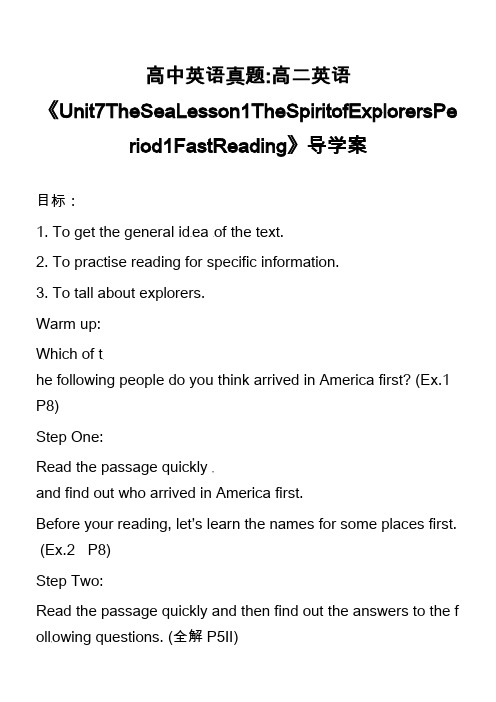
高中英语真题:高二英语《Unit7TheSeaLesson1TheSpiritofExplorersPe riod1FastReading》导学案目标:1. To get the general id ea of the text.2. To practise reading for specific information.3. To tall about explorers.Warm up:Which of the following people do you think arrived in America first? (Ex.1 P8)Step One:Read the passage quicklyand find out who arrived in America first.Before your reading, let’s learn the names for some places first. (Ex.2 P8)Step Two:Read the passage quickly and then find out the answers to the f ollowing questions. (全解P5Ⅱ)1. Why did Eric the Red leave Iceland?A. Because he got into trouble for a murder he had committed.B. Because he wanted to search for new land.C. Because people in Iceland didn’t like him.D. Because he wanted to search for his father.2. Who was Biarni looking for when he was blown to an unknown land?A. LeifB. Eric the RedC. Eric’s partyD. His ancestor3. How do we know about the Vikings?A. Through stories which were written down centuries later in N orway and Iceland.B. By words of mouth.C. Through newspaper.D. According to official records.4. Which of the following statements is TRUE?A. Eric and his 25 ships arrived at Greenland successfully.B. With the help of his friend, Biarni’s journey to Greenland was rather easy.C. The Vikings were the first people to arrive at Europe.D. Leif sailed as far as Newfoundland.5. We can infer from the passage that ______.A. Eric’s second voyage to Greenland was much easier than the first one.B. Leif was strong-minded.C. the Vikings chose to live in Southern Europe because their a ncestors came from Scandinavia.D. no people liked to follow Eric to Greenland.Step Three (全解P5Ⅰ)Read the text carefully to get some specific information from the text.Decide the following sentences are True or False1. Eric the Red forced people to go to Greenland with him t ogether.2. Biarni set sail from Greenland in search of Eric’s party.3. Eric the Red set sail once again, and this time all ships got to Greenland.4. The Vikings were stronger and stronger in Northern Europe fr om the 8 th to 10 th century AD.5. According to official records the Vikings reached America long befor e Columbus ever set sail.Step Four:Read the passage to get the general idea of the text to answer the questions of Ex4 and fill in the blanks in Ex3Step Five:Do Ex 6 on P9 and then do some exercises.高二英语《Unit7TheSeaLesson1TheSpiritofExplorersPe riod1FastReading》导学案目标:1. To get the general id ea of the text.2. To practise reading for specific information.3. To tall about explorers.Warm up:Which of the following people do you think arrived in America first? (Ex.1 P8)Step One:Read the passage quickly and find out who arrived in America first.Before your reading, let’s learn the names for some places first. (Ex.2 P8)Step Two:Read the passage quickly and then find out the answers to the following questions. (全解P5Ⅱ)1. Why did Eric the Red leave Iceland?A. Because he got into trouble for a murder he had committed.B. Because he wanted to search for new land.C. Because people in Iceland didn’t like him.D. Because he wanted to search for his father.2. Who was Biarni looking for when he was blown to an unknown land?A. LeifB. Eric the RedC. Eric’s partyD. His ancestor3. How do we know about the Vikings?A. Through stories which were written down centuries later in Norway and Iceland.B. By words of mouth.C. Through newspaper.D. According to official records.4. Which of the following statements is TRUE?A. Eric and his 25 ships arrived at Greenland successfully.B. With the help of his friend, Biarni’s journey to Greenland was rather easy.C. The Vikings were the first people to arrive at Europe.D. Leif sailed as far as Newfoundland.5. We can infer from the passage that ______.A. Eric’s second voyage to Greenland was much easier than the first one.B. Leif was strong-minded.C. the Vikings chose to live in Southern Europe because their ancestors came from Scandinavi a.D. no people liked to follow Eric to Greenland.Step Three (全解P5Ⅰ)Read the text carefully to get some specific information from the text.Decide the following sentences are True or False1. Eric the Red forced people to go to Greenland with him together.2. Biarni set sail from Greenland in search of Eric’s party.3. Eric the Red set sail once again, and this time all ships got to Greenland.4. The Vikings were stronger and stronger in Northern Europe from the 8 th to 10 th century AD.5. Acco rding to official records the Vikings reached America long before Columbusever set sail.Step Four:Read the passage to get the general idea of the text to answer the questions of Ex4 and fill in th e blanks in Ex3Step Five:Do Ex 6 on P9 and then do some exercises.。
新编英语教程7unit 1 concepts of space
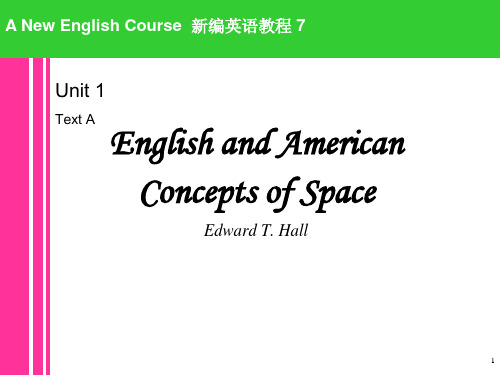
20
领导
高级英语3 A New English Course 7
Unit 1 English and American Concepts of Space
21
沐浴的时间
高级英语3 A New English Course 7
Unit 1 English and American Concepts of Space
Attitudes Unspoken rules
Values Unconscious rules
Like an iceberg, 9/10 of culture is below the surface.
29
PPT Intercultural communication
Video Intercultural communication
6
旅游
高级英语3 A New English Course 7
Unit 1 English and American Concepts of Space
7
人际关系
高级英语3 A New English Course 7
Unit 1 English and American Concepts of Space
How is the thesis statement developed?
contrasts
41
高级英语3 A New English Course 7
Unit 1 English and American Concepts of Space
Words or phrases used to indicate contrasts
高级英语3 A New English Course 7 Unit 1 English and American Concepts of Space 40
新编英语教程7 (Unit 5-14 Text I 译文)
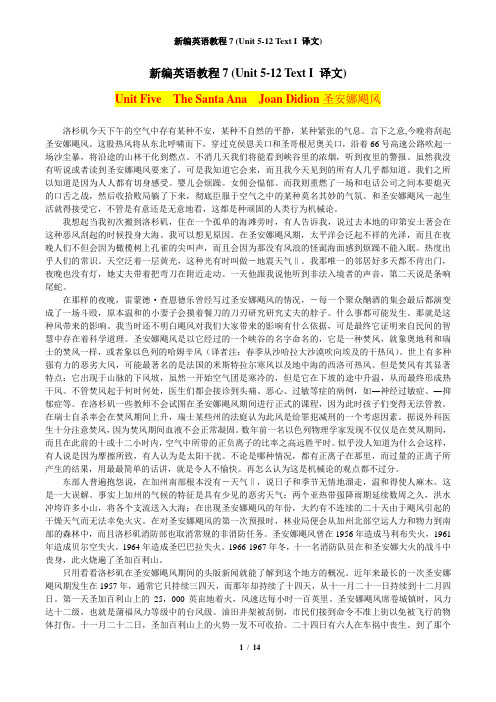
新编英语教程7 (Unit 5-12 Text I 译文)Unit Five The Santa Ana Joan Didion圣安娜飓风洛杉矶今天下午的空气中存有某种不安,某种不自然的平静,某种紧张的气息。
言下之意,今晚将刮起圣安娜飓风。
这股热风将从东北呼啸而下,穿过克侯恩关口和圣哥根尼奥关口,沿着66号高速公路吹起一场沙尘暴,将沿途的山林干化到燃点。
不消几天我们将能看到峡谷里的浓烟,听到夜里的警报。
虽然我没有听说或者读到圣安娜飓风要来了,可是我知道它会来,而且我今天见到的所有人几乎都知道。
我们之所以知道是因为人人都有切身感受。
婴儿会烦躁。
女佣会愠郁。
而我则重燃了一场和电话公司之间本要熄灭的口舌之战,然后收拾败局躺了下来,彻底臣服于空气之中的某种莫名其妙的气氛。
和圣安娜飓风一起生活就得接受它,不管是有意还是无意地看,这都是种顽固的人类行为机械论。
我想起当我初次搬到洛杉矶,住在一个孤单的海滩旁时,有人告诉我,说过去本地的印第安土著会在这种恶风刮起的时候投身大海。
我可以想见原因。
在圣安娜飓风期,太平洋会泛起不祥的光泽,而且在夜晚人们不但会因为橄榄树上孔雀的尖叫声,而且会因为那没有风浪的怪诞海面感到烦躁不能入眠。
热度出乎人们的常识。
天空泛着一层黄光,这种光有时叫做―地震天气‖。
我那唯一的邻居好多天都不肯出门,夜晚也没有灯,她丈夫带着把弯刀在附近走动。
一天他跟我说他听到非法入境者的声音,第二天说是条响尾蛇。
在那样的夜晚,雷蒙德·查恩德乐曾经写过圣安娜飓风的情况,―每一个聚众酗酒的集会最后都演变成了一场斗殴,原本温和的小妻子会摸着餐刀的刀刃研究研究丈夫的脖子。
什么事都可能发生。
那就是这种风带来的影响。
我当时还不明白飓风对我们大家带来的影响有什么依据,可是最终它证明来自民间的智慧中存在着科学道理。
圣安娜飓风是以它经过的一个峡谷的名字命名的,它是一种焚风,就象奥地利和瑞士的焚风一样,或者象以色列的哈姆辛风(译者注:春季从沙哈拉大沙漠吹向埃及的干热风)。
新编英语教程Unit 7 TextI The Throw-Away Society
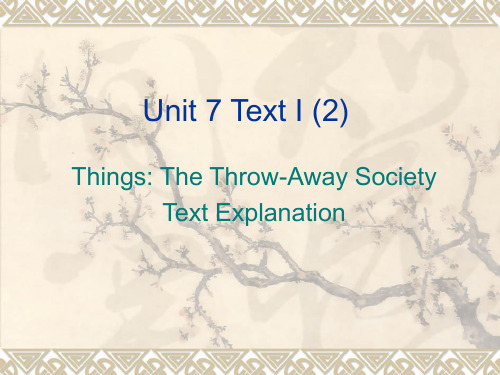
❖ 9. value judgments:
❖ judgments about the quality of something, based on opinion rather than facts;
❖ 价值判断
❖ 10. lingering
❖ literal meaning: slow to disappear
❖ 12. ruthlessly eliminated
❖ done away with/thrown out completely
❖ ruthless: cruelly, mercilessly; in this context: firmly and completely
❖ A decision was made ruthlessly to carry through the reform.
behaving ❖ Information technology had made a great
impact on modern life.
❖8. foreshorten:
❖to make seem smaller, shorter, closer together than is really the case
❖ 按透视法(或按观察角度)缩短线条等
❖the foreshortening of our relationship with things accelerates the pace of life:
❖the attempt to make our relationships with things transient causes our life to move on faster
❖ adv. perfectly, elegantly
第七章 unit 7 《新编旅游英语教程》 PPT课件
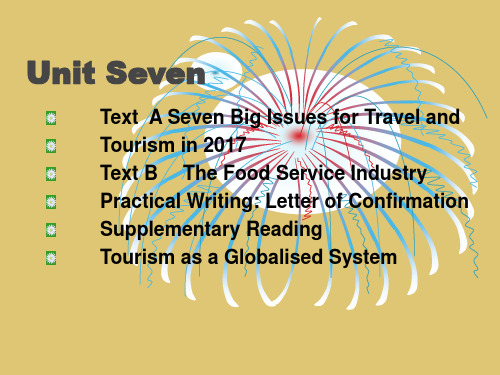
• Text A
Notes 3.Civil Aviation Authority (CAA) 民航局 4.…, but with a well-reported operator failure just days into the New Year, how will the CAA and other regulators respond and what will be the impact for your business?……但是,如果刚刚进入新年就传来运营商失败 的消息,那么CAA和其他监管机构该怎么回应呢?您的业务 又会有什么影响呢?
特许经营人(或公司)
outlet
n.
专营店,经销店,出口,出路
disposable adj.
可任意使用的,一次性的
• Text B • The Food Service Industry
Words and Expressions
offset
n.
抵销, 弥补, 分支, 平版印刷
personnel n.
Words and Expressions
advertising n.
广告业, 广告
start-up
adj. (新企业或工程)开办阶段的,启动时期的
franchisor
n. 授予(他人)特许权的公司(或组织)
regional
adj. 整个地区的, 地方的, 地域性的
• Text B • The Food Service Industry
Notes the food service industry 食品行业 specialty restaurants 特色餐厅,风味餐厅
• Text B
• The Food Service Industry
新编英语教程7unit seven The Aims of Education

Culture is activity of thought, and receptiveness to beauty and humane feeling. Scraps of information have nothing to do with it. A merely well-informed man is the most useless bore on God’s earth. What we should aim at producing is men who possess both culture and expert knowledge in some special direction. Their expert knowledge will give them the ground to start from, and their culture will lead them as deep as philosophy and as high as art. We have to remember that the valuable intellectual development is self-development, and that it mostly takes place between the ages of sixteen and thirty. As to training, the most important part is given by mothers before the age of twelve. A saying due to Archbishop Temple illustrates my meaning. Surprise was expressed at the success in after-life of a man, who as a boy at Rugby had been somewhat undistin-guished. He answered, “It is not what they are at eighteen, it is what they become afterwards that matters.”In training a child to activity of thought, above all things we must beware of what I will call “inert ideas”—that is to say, ideas that are merely received into the mind without being utilised, or tested, or thrown into fresh combinations.In the history of education, the most striking phenomenon is that schools of learning, which at one epoch are alive with a ferment of genius, in a succeeding generation exhibit merely pedantry and routine. The reason is, that they are overladen with inert ideas. Education with inert ideas is not only useless: it is, above all things, harmful—Corruptio optimi, pessima. Except at rare intervals of intellectual ferment, education in the past has been radically infected with inert ideas. That is the reason why uneducated clever women, who have seen much of the world, are in middle life so much the most cultured part of the community. They have been saved from this horrible burden of inert ideas. Every intellectual revolution which has ever stirred humanity into greatness has been a passionate protest against inert ideas. Then, alas, with pathetic ignorance of human psychology, it has proceeded by some educational scheme to bind humanity afresh with inert ideas of its own fashioning.Let us now ask how in our system of education we are to guard against this mental dry rot. We enuncia te two educational commandments, “Do not teach too many subjects,” and again, “What you teach, teach thoroughly.”The result of teaching small parts of a large number of subjects is the passive reception of disconnected ideas, not illumined with any spark of vitality. Let the main ideas which are introduced into a child’s education be few and important, and let them be thrown into every combination possible. The child should make them his own, and should understand their application here and now in the circumstances of his actual life. From thevery beginning of his education, the child should experience the joy of discovery. The discovery which he has to make, is that general ideas give an understanding of that stream of events which pours through his life, which is his life. By understanding I mean more than a mere logical analysis, though that is included. I mean “understanding’ in the sense in which it is used in the French proverb, “To understand all, is to forgive all.” Pedants sneer at an education which is useful. But if education is not useful, what is it? Is it a talent, to be hidden away in a napkin? Of course, education should be useful, whatever your aim in life. It was useful to Saint Augustine and it was useful to Napoleon. It is useful, because understanding is useful.I pass lightly over that understanding which should be given by the literary side of education. Nor do I wish to be supposed to pronounce on the relative merits of a classical or a modern curriculum. I would only remark that the understanding which we want is an understanding of an insistent present. The only use of a knowledge of the past is to equip us for the present. No more deadly harm can be done to young minds than by depreciation of the present. The present contains all that there is. It is holy ground; for it is the past, and it is the future. At the same time it must be observed that an age is no less past if it existed two hundred years ago than if it existed two thousand years ago. Do not be deceived by the pedantry of dates. The ages of Shakespeare and of Molière are no less past than are the ages of Sophocles and of Virgil. The communion of saints is a great and inspiring assemblage, but it has only one possible hall of meeting, and that is, the present, and the mere lapse of time through which any particular group of saints must travel to reach that meeting-place, makes very little difference.Passing now to the scientific and logical side of education, we remember that here also ideas which are not utilised are positively harmful. By utilising an idea, I mean relating it to that stream, compounded of sense perceptions, feelings, hopes, desires, and of mental activities adjusting thought to thought, which forms our life. I can imagine a set of beings which might fortify their souls by passively reviewing disconnected ideas. Humanity is not built that way except perhaps some editors of newspapers.In scientific training, the first thing to do with an idea is to prove it. But allow me for one moment to extend the meaning of “prove”; I mean—to prove its worth. Now an idea is not worth much unless the propositions in which it is embodied are true. Accordingly an essential part of the proof of an idea is the proof, either by experiment or by logic, of the truth of the propositions. But it is not essential that this proof of the truth should constitute the first introduction to the idea. After all, its assertion by the authority of respectable teachers is sufficient evidence to begin with. Inour first contact with a set of propositions, we commence by appreciating their importance. That is what we all do in after-life. We do not attempt, in the strict sense, to prove or to disprove anything, unless its importance makes it worthy of that honour. These two processes of proof, in the narrow sense, and of appreciation, do not require a rigid separation in time. Both can be proceeded with nearly concurrently. But in so far as either process must have the priority, it should be that of appreciation by use.Furthermore, we should not endeavour to use propositions in isolation. Emphatically I do not mean, a neat little set of experiments to illustrate Proposition I and then the proof of Proposition I, a neat little set of experiments to illustrate Proposition II and then the proof of Proposition II, and so on to the end of the book. Nothing could be more boring. Interrelated truths are utilised en bloc, and the various propositions are employed in any order, and with any reiteration. Choose some important applications of your theoretical subject; and study them concurrently with the systematic theoretical exposition. Keep the theoretical exposition short and simple, but let it be strict and rigid so far as it goes. It should not be too long for it to be easily known with thoroughness and accuracy. The consequences of a plethora of half-digested theoretical knowledge are deplorable. Also the theory should not be muddled up with the practice. The child should have no doubt when it is proving and when it is utilising. My point is that what is proved should be utilised, and that what is utilised should—so far, as is practicable—be proved. I am far from asserting that proof and utilisation are the same thing.。
- 1、下载文档前请自行甄别文档内容的完整性,平台不提供额外的编辑、内容补充、找答案等附加服务。
- 2、"仅部分预览"的文档,不可在线预览部分如存在完整性等问题,可反馈申请退款(可完整预览的文档不适用该条件!)。
- 3、如文档侵犯您的权益,请联系客服反馈,我们会尽快为您处理(人工客服工作时间:9:00-18:30)。
Tourists旅游者/观光客/游客Nancy Mitford 南西·密特福德New wordsminute, smallVenetian, 威尼斯的`lagoon, A shallow body of water, especially one separated from a sea by sandbars or coral reefs.vineyard, Ground planted with cultivated grapevines.William the Conqueror, Duke of Normandy, who set up a claim to the throne of England and launched an attack against the island in 1066. intersected, criss-crossedcampanile, A bell tower, especially one near but not attached to a church or other public building.reproach, To express disapproval of, criticism of, or disappointment in (someone).cloches, cloches, divines reproaches, [French] Bells, bells, divine reproacheschorus, A simultaneous utterance by a number of people; The sounds so madechartered motor-boats, motor-boats hired for an exclusive useyachts, small sailing or motor-driven vessels, generally with smart, graceful lines, used for pleasure cruises or racing.amblev, To walk slowly or leisurely; stroll.tow-path, a path along which people draw a boat against the current mosaics, a form of surface decoration made by inlaying small pieces of colored glass or stone; a picture or design so made.austere, Severe or stern in disposition or appearance; somber and grave Madonna, a statue or picture of the Virgin Mary.Byzantine, an artistic style of architecture developed in the Byzantine Empire (The East Roman Empire) during the 4th century, characterized by the round arch springing from the columns or piers, and the dome resting on pendentives.the throne of Attila, Attila (406-453), king of the Huns, who overran much of the Byzantine and Western Roman Empires. In 451 he advanced as far as Orlean in Gaul and in 452 to the river Mincio in Italy. he later came to be called "Scourge of God."scent, To fill with a pleasant odor;standing, Permanent and unchanging; fixedmegaphone, A funnel-shaped device used to direct and amplify the voice. luncheon, A lunch, especially a formal one.undergo, To pass through; experiencelitter, Carelessly discarded refuse, such as wastepaperText1 The most intensive study I ever made of tourists as at Torcello, where it is impossible to avoid them. Torcello is a minute island in the Venetian lagoon: here, among vineyards and wild flowers, some thirty cottages surround a great cathedral which was being built when William the Conqueror came to England. A canal and a path lead from the lagoon to the village, the vineyards are intersected by canals; red and yellow sails glide slowly through the vines. Bells from the campanile ring out reproaches three times a day ("cloches, cloches, divines reproaches") joined by a chorus from the surrounding islands. There is an inn where I lived one summer, writing my book and observing the tourist. Torcello which used to be lonely as a cloud has recently become an outing from Venice. Many more visitors than it can comfortably hold pour into it, off the regular steamers, off chartered motor-boats, and off yachts; all day they ambled up the tow-path, looking for what? The cathedral is decorated with early mosaics -- scenes from hell, much restored, and a great sad, austere Madonna; Byzantine art is an acquired taste and probably not one in ten of the visitors has acquired it. They wander into the church and look round aimlessly. They come out on to the village green and photograph each other in a stone armchair, said to be the throne of Attila. They relentlessly tear at the wild roses which one has seen in bud and longed to see in bloom and which, for a day have scented the whole island. As soon as they are picked the roses fade and are thrown into the canal. The Americans visit the inn to eat or drink something. The English declare that they can't afford to do this. They take food which they have brought with them into the vineyard and I am sorry to say leave the devil of a mess behind them. An outline of the selection: A. Torcello which used to be lonely has recently become an outing from Venice.a) Tocello's locationb) A general view of Tocello.c) Too many visitors pour into it.d) Most of them are ignorant and rude.e) Concrete description of the visitors:1) Americans.2)Every Thursday Germans come up the tow-path, marching as to war, with a Leader. There is a standing order to fifty luncheons at the inn; while they eat the Leader lectures them through a megaphone. After luncheon they march into the cathedral and undergo another lecture. They, at least, know what they are seeing. Then they march back to their boat. They are tidy; they leave no litter. Englishmen 3) Germans译文1 我曾对游客最深入细致的研究,是在托塞罗做的。
